POUR L’OPINION PUBLIC MONDIALE
Le soulèvement qui a commencé en Mars 2011 en Syrie continue sans cesse. Le régime d’Assad utilise tous les moyens pour cesser le soulèvement. Par conséquent, le pays est en ruines et des milliers de familles ont du quitter leur pays. Pendant que les rebelles luttent contre les pratiques fascistes du régime, d’autres groupes marginales et les gangs liés au régime terrorise la population. Par conséquent, tous les Syriens sont affectés ainsi le peuple Syriaque et ses institutions religieuses. Jusqu’à aujourd’hui, des centaines de Syriaque- Grecque-Maronites ont été tué à cause de leur identité Chrétienne. Des centaines de Syriaques ont été kidnappé pour des rançons et des sommes très élevé et faute de provision de rançon les ravisseurs tuent leur victimes. Les établissements commerciaux et les domiciles sont prioritaires pour les gangs.
State spares 1 million lira budget for Mor Gabriel Monastery
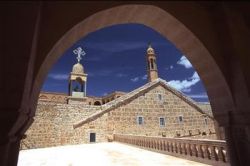
Midyat Governor’s Office has allocated a budget of 1 million Turkish Liras for the restoration of the road leading to the Syriacs’ Mor Gabriel Monastery, a move viewed by the Syriac community as contradictory as the monastery was previously labeled an “occupier” and its lands were transferred to the Treasury.
| Read more … State spares 1 million lira budget for Mor Gabriel Monastery
The Unbearable Lightness of Syria Policy
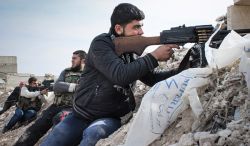
Supporting Assad’s non-jihadist enemies may be our least bad option.
But deciding on something is what presidents get paid the big bucks to do. Obama is right to find the available options unappealing, but the problem remains. Declining to choose is no solution; it simply leaves it to others including those most hostile to America to call the shots.
How to Save a Dying Language
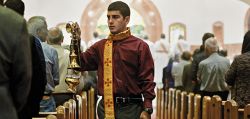
It was a sunny morning in May, and I was in a car with a linguist and a tax preparer trolling the suburbs of Chicago for native speakers of Aramaic, the 3,000-year-old language of Jesus.
The linguist, Geoffrey Khan of the University of Cambridge, was nominally in town to give a speech at Northwestern University, in Evanston. But he had another agenda: Chicago’s northern suburbs are home to tens of thousands of Assyrians, Aramaic-speaking Christians driven from their Middle Eastern homelands by persecution and war. The Windy City is a heady place for one of the world’s foremost scholars of modern Aramaic, a man bent on documenting all of its dialects before the language—once the tongue of empires—follows its last speakers to the grave.
Syriac Orthodox Christians in Turkey: ''This Is Simply Our Home''
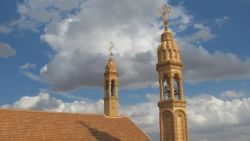
In recent years, around 60-100 Syriac Orthodox families have returned from central Europe to Turkey. Encouraged by changes in the political atmosphere, the minority nonetheless faces a host of problems, from the expropriation of land belonging to a monastery, to a ban on special schools and kindergartens, and also a lack of places of worship in Istanbul. By Ekrem Eddy Güzeldere
| Read more … Syriac Orthodox Christians in Turkey: ''This Is Simply Our Home''
Christians Squeezed Out by Violent Struggle in North Syria
MIDYAT, TURKEY — The bright voices of children at play echoed off the ancient walls of Mor Hanonyo last week, breaking centuries of stillness in this 1,600-year-old Syriac Orthodox monastery outside Mardin in southeastern Turkey. Little boys skipped around the monastery courtyard zipped up in quilted winter jackets, while their elders huddled indoors and lamented the violence and mayhem that have forced them to flee their homes in Syria.
| Read more … Christians Squeezed Out by Violent Struggle in North Syria
Syriacs want separate refugee camp in Turkey
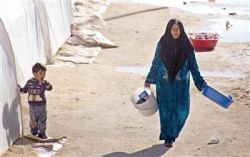
Leading Syriac figures say they met with officials from the ruling Justice and Development Party (AKP) and Foreign Ministry in an effort to establish a separate camp in Mardin for Syriac citizens who are defecting from Syria.
EU ‘seriously concerned' about Mor Gabriel Monastery
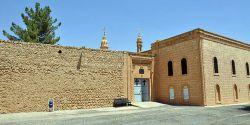
The European Union has stated that it is "seriously concerned" about a court decision on the Mor Gabriel Monastery in Mardin.
The spokesman for Stefan Füle, the commissioner responsible for the Enlargement and European Neighborhood Policy said the commission was concerned both about the verdict and about the fact that the litigation against the monastery had been started by state authorities.
| Read more … EU ‘seriously concerned' about Mor Gabriel Monastery
An outpost of Aramaic speakers; The battle for Mor Gabriel
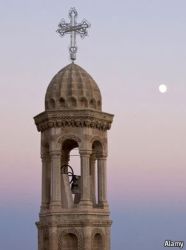
WHEN the Young Turks enlisted Kurdish tribesmen to take part in the mass slaughter of the Armenians in 1915, Muslim clerics spurred on their flocks: those who slew Christians would be blessed with wealth and beautiful girls and their places in heaven assured. Although the deaths of around 1m Ottoman Armenians are well documented, little is known about the tens of thousands of Syriacs, one the world’s oldest Christian communities, who fell with them.
| Read more … An outpost of Aramaic speakers; The battle for Mor Gabriel
Legal Issues Cast Doubt on Return of Christians to Turkey's Southeast
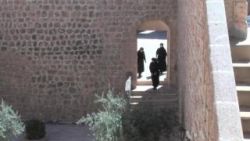
Turkey is home to Syriac Christians, whose followers extend across the Middle East. In the 1990s, many Syriac Christians fled Turkey during years of fighting between the Turkish state and Kurdish rebels. In the last few years, they have been returning. But a series of court cases against the ancient monastery of Mor Gabriel, in southeastern Turkey, has put their return increasingly in doubt.
For 1,600 years, the bell at the Syriac Orthodox Mor Gabriel Monastery has called people to prayer. The ceremonies are conducted in Aramaic, a language spoken at the time of Christ.
GianThe building and region around it have survived invasions by Persians, Arabs, Mongols, Kurds and Turks, going back more than 1,000 years.
| Read more … Legal Issues Cast Doubt on Return of Christians to Turkey's Southeast

